By Maxmilian Wechsler
Half finished copies of Ferraris, Aston Martins and Lamborghinis fill a secret Bangkok factory
| REGULAR readers of BigChilli will no doubt remember the story in September last year about Schönes, the company that manufactures replica supercars in Thailand. Well, I recently received an invite from the company’s owner, Chris Pongpitaya, to visit the company’s newer, bigger premises. As I couldn’t just turn up – the invite read: “You are welcome to visit us, by appointment only”– my curiosity was piqued. Just exactly what are he and his team creating at their new premises? |
| After requesting the address and an appointment, I received further emails from a man I had never met, and who spoke over the phone in a German accent. He later requested that neither his identity nor any background information on him should be published, However, his name, position (listed as automobile engineer), mobile and factory phone numbers, together with the factory address were printed right on his Schönes company name card. Although the invitation said the factory had moved, it was in fact in the same location in the Lat Phrao area of Bangkok I visited in August last year. On arrival at the factory this time both Chris and the engineer were on hand to greet me and a colleague. It was clear that the pair had been collaborating for some time. The reason for the sudden invitation was never explained, except that a new roof was now almost completed. During the interview the engineer displayed a sound technical knowledge of sports cars and other types of vehicles, and thanks to his fluency in English he was able to describe details about the company and its products much better than Chris could. On my first visit to the factory in November 2008, it was a “temporary” premises not too far from the current one. In my five previous visits over a four-year period to the two factories I had never seen a completed replica car, so before this visit I specifically requested to be finally shown one. |
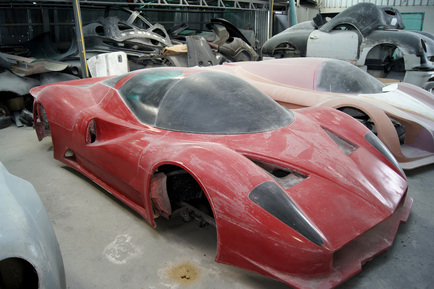
However, while we were allowed to walk around the factory and photograph replica cars in various stages of completion, we were again denied the opportunity to see a finished product. Chris preferred to show us photos of nearly completed cars on the computer in his small office. He promised to email the photos but never did.
It is perhaps understandable that Chris is reluctant to show a completed replica before it is delivered to the customer, whether locally or shipped in a container abroad. Yet it was disappointing to be denied once again a look at a finished car.
In fact, the only finished replica allegedly produced by Chris that I have ever seen was on YouTube – a yellow Porsche 993 GT2 with Thai registration. The clip was made by a foreign television crew that visited the same factory before the roof was installed. An English commentary on the clip says: “Chris admitted that what he is doing is illegal but he argues he does it for a good cause.”
This is the opposite to what he has told me over the past four years. Chris has always maintained that he is doing nothing wrong and is not breaking any Thai laws. In the clip Chris is quoted, in English translated from Thai, as saying: “Having a car like this is a dream for many people but they can’t afford it, so they can drive these replicas instead. God will understand.”
A French photo-journalist who has visited Chris’s factories a few times also says he’s always been shown cars under construction and never seen one even close to completion.
On this visit there were no finished cars, and Chris said we’d have to wait for a few months to see one. It’s a promise we’ve heard before. Chris mentioned a few years ago that the exteriors of most of his replica supercars are actually made from moulds in the northeastern part of Thailand and then transported to his Bangkok factory. He’s even said in the past he had other premises on Ekamai Road right in the centre of Bangkok.
There were more than 30 cars at the factory when we visited last year. Most were in an early stage of assembly. They resembled Aston Martin, Ferrari, Hummer and Lamborghini models. We didn’t see any interior parts around or painting facilities so it is likely these are in another factory.
The ‘farang’ engineer said that there are about ten people working in the factory, the same number as last year. One car – a German supercar ordered by an American customer for three million baht – was still in almost the same unfinished condition.
A replica Aston Martin looked pretty good on the outside, but the interior was a real mess. Chris said he had received several orders from foreign customers for this popular British-made car.
Still a ‘Stranger’; electric secrets
It is perhaps understandable that Chris is reluctant to show a completed replica before it is delivered to the customer, whether locally or shipped in a container abroad. Yet it was disappointing to be denied once again a look at a finished car.
In fact, the only finished replica allegedly produced by Chris that I have ever seen was on YouTube – a yellow Porsche 993 GT2 with Thai registration. The clip was made by a foreign television crew that visited the same factory before the roof was installed. An English commentary on the clip says: “Chris admitted that what he is doing is illegal but he argues he does it for a good cause.”
This is the opposite to what he has told me over the past four years. Chris has always maintained that he is doing nothing wrong and is not breaking any Thai laws. In the clip Chris is quoted, in English translated from Thai, as saying: “Having a car like this is a dream for many people but they can’t afford it, so they can drive these replicas instead. God will understand.”
A French photo-journalist who has visited Chris’s factories a few times also says he’s always been shown cars under construction and never seen one even close to completion.
On this visit there were no finished cars, and Chris said we’d have to wait for a few months to see one. It’s a promise we’ve heard before. Chris mentioned a few years ago that the exteriors of most of his replica supercars are actually made from moulds in the northeastern part of Thailand and then transported to his Bangkok factory. He’s even said in the past he had other premises on Ekamai Road right in the centre of Bangkok.
There were more than 30 cars at the factory when we visited last year. Most were in an early stage of assembly. They resembled Aston Martin, Ferrari, Hummer and Lamborghini models. We didn’t see any interior parts around or painting facilities so it is likely these are in another factory.
The ‘farang’ engineer said that there are about ten people working in the factory, the same number as last year. One car – a German supercar ordered by an American customer for three million baht – was still in almost the same unfinished condition.
A replica Aston Martin looked pretty good on the outside, but the interior was a real mess. Chris said he had received several orders from foreign customers for this popular British-made car.
Still a ‘Stranger’; electric secrets
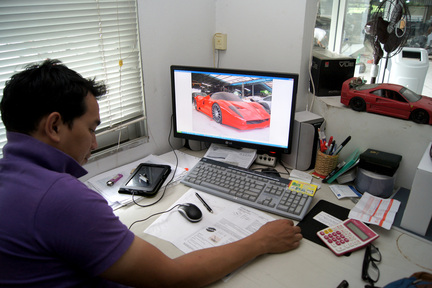
Four years ago, Chris said that “his ultimate dream” was to produce a Thai-made supercar. This time he showed us three different prototype shells under the brand name ‘Stranger.’ He says he plans to sell the rights to manufacture the cars to an investor but wouldn’t say if there is such a deal in progress. He did say the three Stranger supercars should be ready within six months and then he’d invite us to see them. I am not holding my breath.
“We will use a BMW 12-cylinder engine installed in the rear. A second-hand engine costs about 100,000 baht. The final asking price of the car will be over one million baht.”
“We will use a BMW 12-cylinder engine installed in the rear. A second-hand engine costs about 100,000 baht. The final asking price of the car will be over one million baht.”
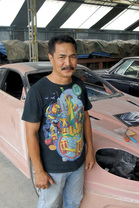
Plans to produce electric vehicles are also underway, and several prototypes based on golf carts were in evidence, but Chris refuses to elaborate on this project.
Chris said he sold his house in Germany, where he worked for 14 years for Porsche and Brabus, to raise money for his business here. He says that most of his replicas are ordered by foreigners and exported, and that every customer must make a 30 to 40 per cent advance payment.
Chris admits that lawyers and certain car companies have been “after him,” but insists he isn’t breaking any copyright laws because the cars do not carry a logo.
“If you put a logo on a car, this could be a problem. But I can do so with cars like Ferraris, which are out of production, such as the F40 or the Testarosa.
“What I’m doing is not like copying 1,000 Moschino bags. I am only making a few pieces.”
How can the cars be registered? Chris confesses he doesn’t know. “It is not my problem or responsibility. It is up to the customer. I am only making the cars. However, from what I hear, it is not easy.” He also refuses responsibility for maintenance and doesn’t offer warranty. If a car needs repairs, it’s up to the customer to take it to a garage.
Chris said he sold his house in Germany, where he worked for 14 years for Porsche and Brabus, to raise money for his business here. He says that most of his replicas are ordered by foreigners and exported, and that every customer must make a 30 to 40 per cent advance payment.
Chris admits that lawyers and certain car companies have been “after him,” but insists he isn’t breaking any copyright laws because the cars do not carry a logo.
“If you put a logo on a car, this could be a problem. But I can do so with cars like Ferraris, which are out of production, such as the F40 or the Testarosa.
“What I’m doing is not like copying 1,000 Moschino bags. I am only making a few pieces.”
How can the cars be registered? Chris confesses he doesn’t know. “It is not my problem or responsibility. It is up to the customer. I am only making the cars. However, from what I hear, it is not easy.” He also refuses responsibility for maintenance and doesn’t offer warranty. If a car needs repairs, it’s up to the customer to take it to a garage.

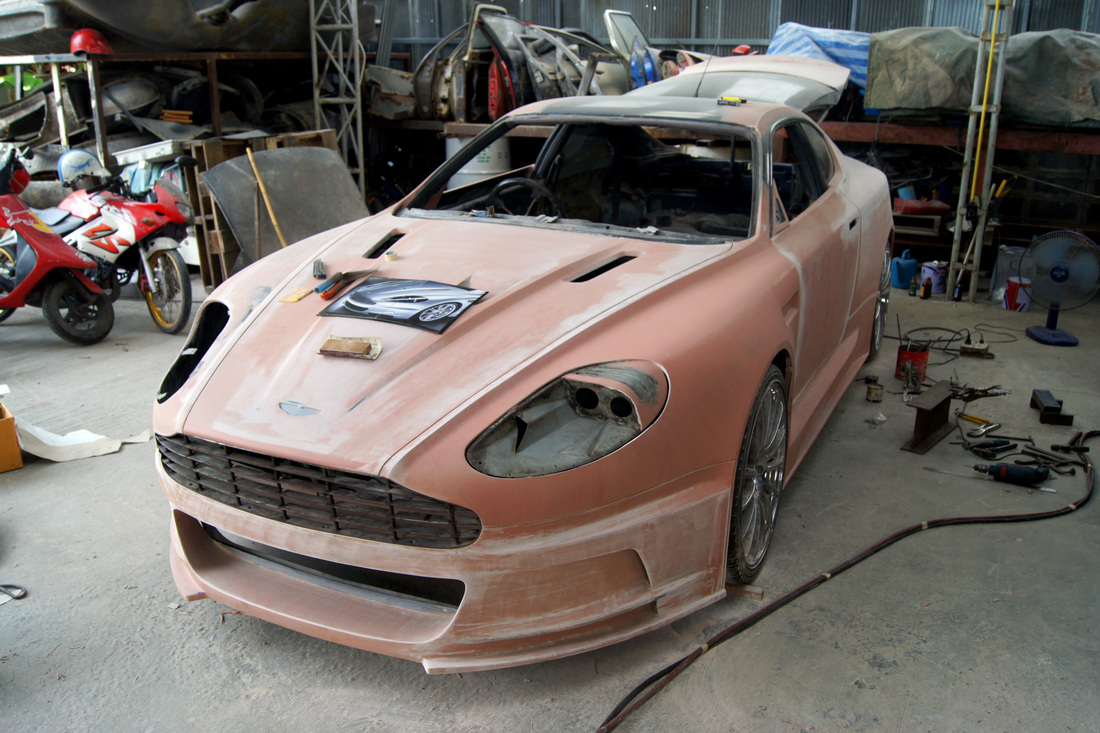
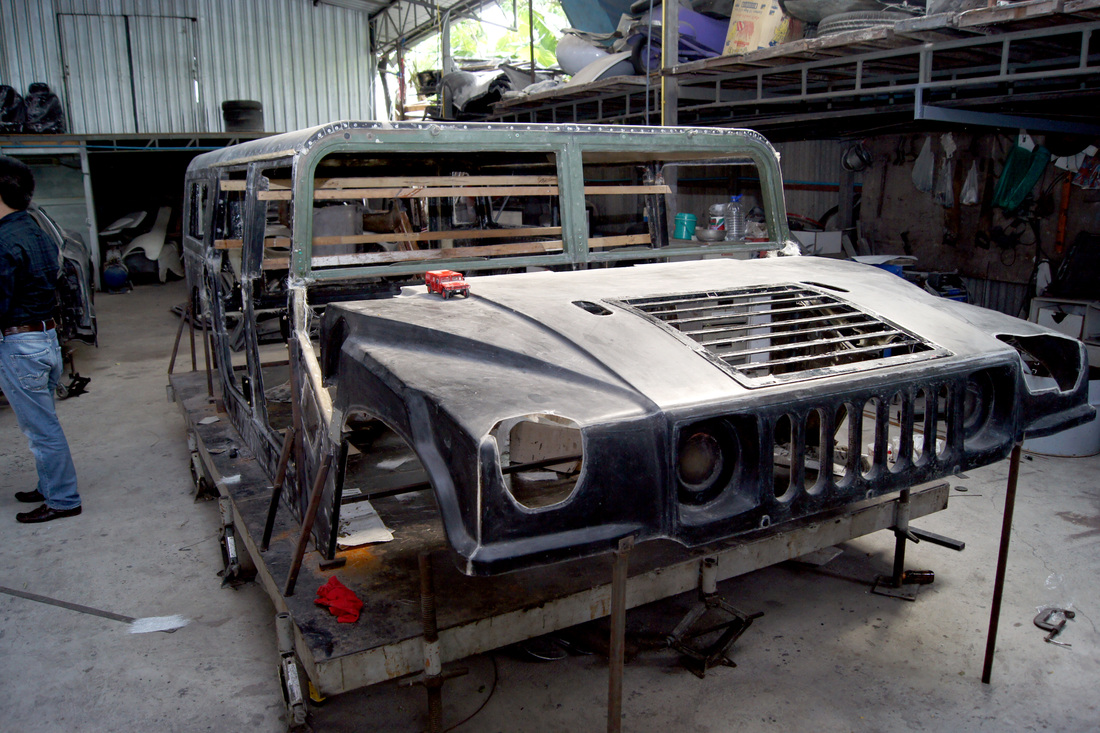
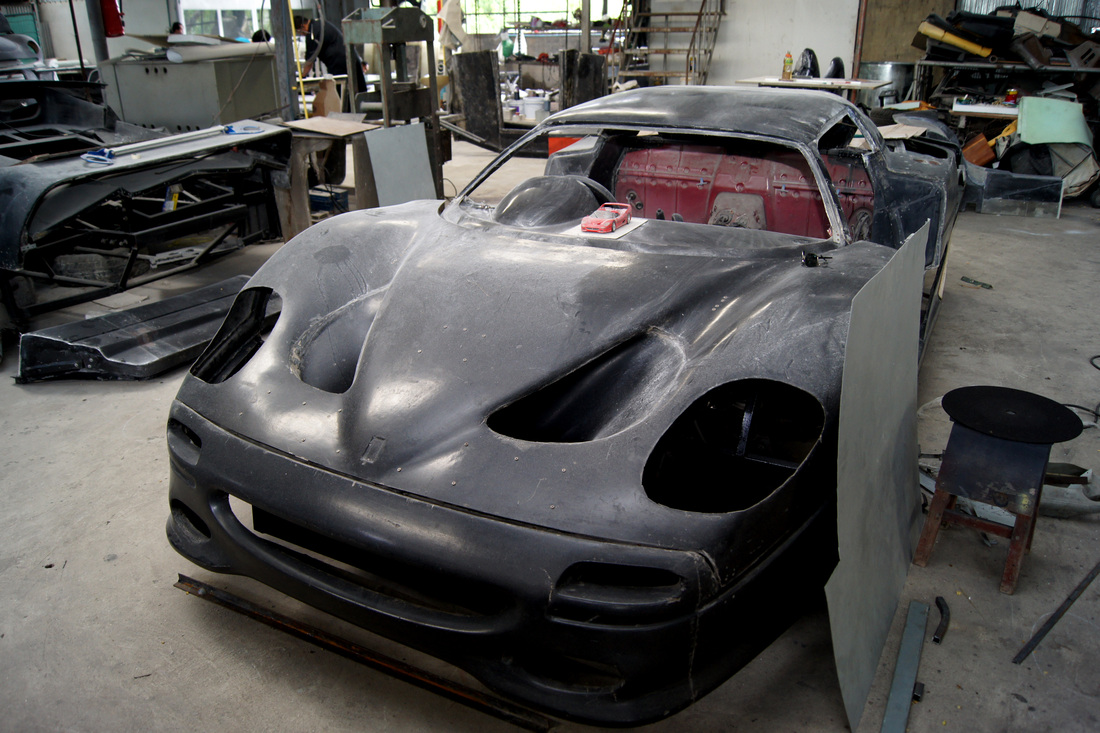
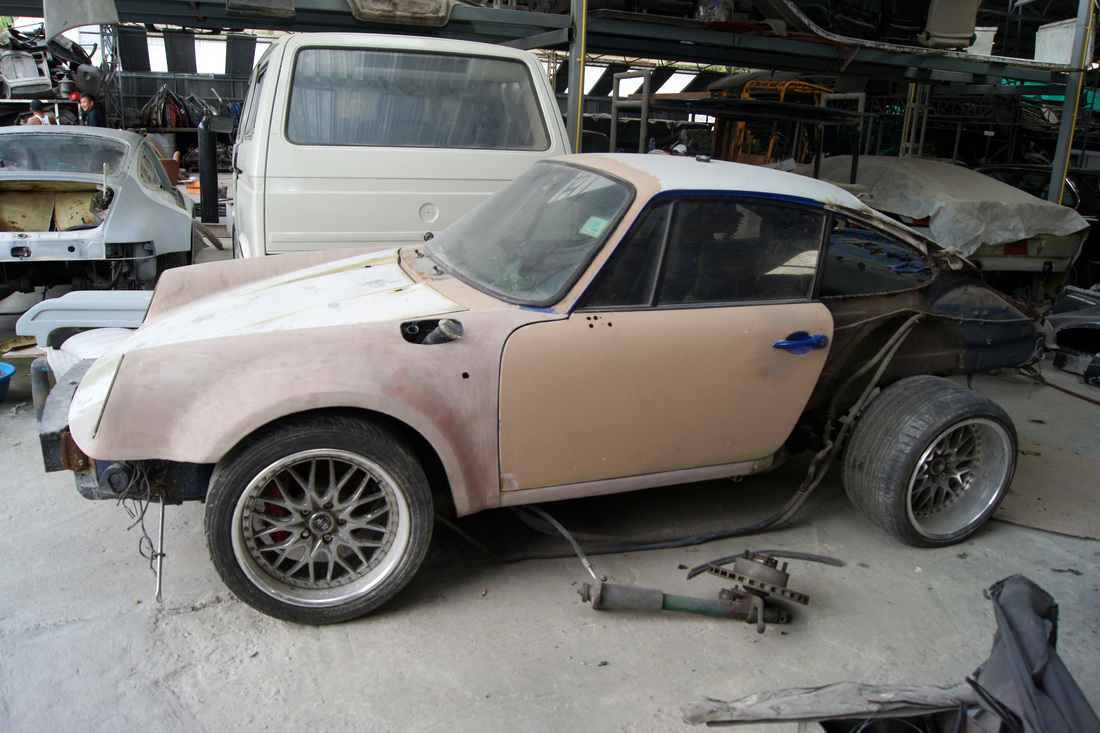
 RSS Feed
RSS Feed
















